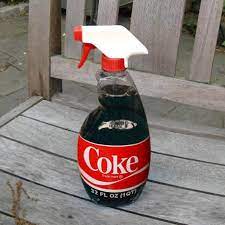Coca-Cola, the world-famous soft drink, has been around for over a century, quenching thirst and pleasing taste buds. Now we Unlock the Surprising Household Hacks of Coca-Cola: But did you know that this fizzy beverage has several unconventional uses as a kitchen and household hack? It’s true! The acidity and carbonation in Coke make it a versatile cleaning agent, capable of tackling several tasks around your home. In this article, we’ll explore some of the fascinating ways you can use Coca-Cola for more than just a refreshing drink.
The Hacks
- Remove rust: Soak rusty tools or bolts in Coca-Cola for a few hours or overnight to help dissolve the rust. The phosphoric acid in Coke helps break down the rust, making it easier to scrub off.
- Clean burnt pans: Pour a can of Coke into a burnt pan and let it simmer on low heat for about 30 minutes. The acidity of the Coke helps to loosen the burnt residue, making it easier to scrub clean.
- Descale a kettle: Fill the kettle with Coke and let it sit for a few hours or overnight. The acidity will help dissolve the limescale build-up. Rinse thoroughly before using the kettle again.
- Clean toilet bowls: Pour a can of Coke into the toilet bowl and let it sit for an hour or two. The acidity will help dissolve stains and mineral deposits. Scrub with a toilet brush and flush.
- Remove grease stains from clothes: Pour a can of Coke into the washing machine along with your regular detergent and run the cycle as usual. The carbonation helps break up and remove grease stains.
- Clean car battery terminals: Pour a small amount of Coke over the corroded battery terminals. The carbonation and acidity will help dissolve the corrosion, making it easier to clean the terminals with a brush.
- Loosen stuck bolts: Pour a small amount of Coke over a stuck bolt to help break down the rust and make it easier to loosen.
- Clean oil stains from garage floors: Pour Coke over oil stains and let it sit for a few hours. Scrub with a stiff brush and rinse with water.
Please note that while Coca-Cola can be an effective cleaning agent in some situations, it should not be considered a substitute for dedicated cleaning products. Always test a small, inconspicuous area first to ensure no damage or discoloration occurs and be sure to rinse surfaces thoroughly after using Coke to clean.
How Can Coke be Safe to Drink??
The cleaning hacks listed above makes me wonder why would I want to consume a product that does all of that? While it contains ingredients like carbonation and phosphoric acid, which can effectively tackle certain cleaning tasks, these components are present in relatively low concentrations that are considered safe for human consumption by regulatory agencies such as the US Food and Drug Administration (FDA) and the European Food Safety Authority (EFSA).
Acidity
The acidity of Coca-Cola is comparable to other common beverages like orange juice and coffee. While it’s true that regularly consuming highly acidic beverages can potentially contribute to dental erosion over time, this risk can be mitigated by practicing good oral hygiene and not sipping on acidic drinks throughout the day.
Notes About Health
It’s important to note that Coca-Cola, as well as other sugary soft drinks, can contribute to health issues such as obesity, type 2 diabetes, and tooth decay if consumed excessively. The key is to enjoy these beverages in moderation and maintain a balanced diet with plenty of water, fruits, vegetables, and whole grains.
Moderation, Moderation
In summary, while Coca-Cola contains ingredients that can be used for cleaning purposes, it is still safe to drink in moderation. However, it’s essential to be mindful of the potential health risks associated with excessive consumption of sugary beverages and maintain a balanced diet.
Know of more hacks? Leave a comment.
Sources and Links:
All links open in a new tab.
- US Food and Drug Administration (FDA) – You can visit their website for information on food safety regulations, guidelines, and recommendations: https://www.fda.gov/
- European Food Safety Authority (EFSA) – This website provides information on food safety standards, guidelines, and scientific research in the European Union: https://www.efsa.europa.eu/
- Centers for Disease Control and Prevention (CDC) – The CDC provides information on nutrition and health, including the effects of consuming sugary beverages: https://www.cdc.gov/nutrition/index.html
- World Health Organization (WHO) – The WHO offers guidelines and recommendations on healthy diets and sugar consumption: https://www.who.int/nutrition/topics/healthy_diet/en/

